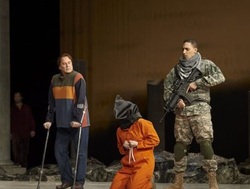 A scene from Hercules (photo: Michael Cooper)
A scene from Hercules (photo: Michael Cooper) And what was this Hercules (a co-production with Chicago’s Lyric Opera) like? At first glance, it appeared to be a modest and rather static affair, half opera and half oratorio. There are only five principal cast members, the orchestra is smallishly baroque in size – and George Tsypin’s one-piece set for the production is a sparse-looking Greek ruin.
Yet, as the performance unfolded, it became apparent that the simplicity of both the work and the production served as a platform for deeper and more elaborate things. Those things included love, anguish, jealousy, deceit, revenge – and plenty of excellent singing.
Vocally speaking, countertenor David Daniels, as the herald Lichas, set the tone for the production with his sweet and delicate delivery. What followed was an ensemble effort of singers committed to giving poised, nuanced and period-attentive performances.
First among equals was soprano Lucy Crowe, as the captive princess Iole. In her first appearance – in orange prison garb with a black bag over her head – her voice was supple and pleasantly lacking in vibrato. And there was more to come: we soon learned that Crowe also has a powerful dramatic edge to her voice, when she wants to use it.
As Hercules’ jealous wife, Dejanira, mezzo Alice Coote was inevitably thrust into a kind of competition with Crowe. Fortunately, she has many strengths to draw upon: her voice was rich and solid, and her florid Handelian roulades were nothing short of astonishing.
Tenor Richard Croft was in fine, lyrical voice as Hyllus, the son of Hercules. However, I’m not sure why Sellars put him on crutches. Was he supposed to be a wounded war-veteran, or the unfortunate son who was crippled from childhood – or what?
At the centre of it all, Eric Owens was both impressive and inadequate in the role of Hercules. A big bear of a man, he was a daunting figure in his military garb. Yet while his dark and growly baritone voice matched his part, he clearly struggled with the some of the passages he was required to sing. Indeed, his attempts to negotiate complicated roulades were, at times, downright embarrassing. (Was this someone’s idea of a clever way to portray Hercules as a man in over his head? I hope not!)
In the pit, conductor Henry Bicket steered his performers towards an understated, less-is-more way of doing things – with very good results. This was especially apparent in the choruses, when the COC Chorus achieved some impressive effects of dynamics and colour. As well, the COC Orchestra, although playing on modern instruments, demonstrated that they were capable and comfortable with baroque style.
© Colin Eatock 2014
 RSS Feed
RSS Feed

